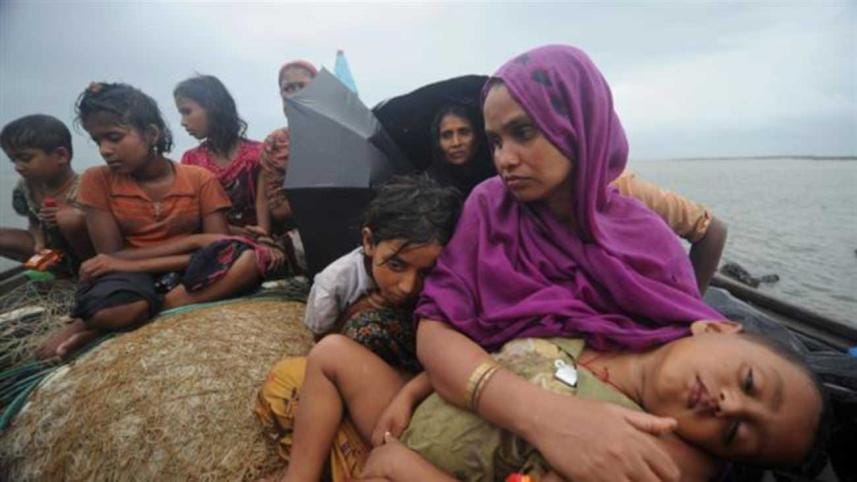The search for a permanent solution for the Rohingyas

2016 did not end completely hopelessly.
In late December, 13 Nobel Laureates including Professor Muhammad Yunus and 10 global leaders wrote an open letter to the President of the United Nations Security Council (UNSC) and its members decrying the Rohingya carnage in Myanmar as "amounting to ethnic cleansing", that the crisis has "the potential for genocide" and that it "has all the hallmarks of recent past tragedies – Rwanda, Darfur, Bosnia, Kosovo". The letter warned that "If we fail to take action, people may starve to death if they are not killed with bullets."
Criticising Aung San Suu Kyi, Myanmar's de facto leader, the letter stressed that, "Despite repeated appeals to Daw Aung San Suu Kyi we are frustrated that she has not taken any initiative to ensure full and equal citizenship rights of the Rohingyas" and as a result, "We urge the United Nations to do everything possible to encourage the Government of Myanmar to lift all restrictions on humanitarian aid, so that people receive emergency assistance… we urge the members of UN Security Council to put this crisis on Security Council's agenda as a matter of urgency, and to call upon the Secretary-General to visit Myanmar in the coming weeks as a priority." The letter also emphasised that in case the current outgoing Secretary-General Ban Ki Moon fails to visit due to shortages of time, the incoming Secretary-General Antonio Guterres (who has already assumed the position since January 1, 2017) must make the proposed visit a priority in his agenda.
Indeed, the letter, a much needed step in the right direction, is a reminder that ethics and morality that have been more prominent by their absence than presence in recent times have not completely deserted us and that at a time where most governments have failed to stand up for humanity, the letter has internationalised the Rohingya tragedy.
Furthermore, the letter, which is an unprecedented occurrence by itself in the sense that a group of Nobel Laureates have joined hands to rebuke a fellow Laureate, is also a signal that Aung San Suu Kyi's charms that once mesmerised most people seemed to have ceased to spread their spell.
Now the question is – where do we go from here?
Immediate humanitarian aid by the international aid givers in the affected areas, something that the letter itself has also asked for, is important and should be done at the earliest, but this is no permanent solution.
For a permanent solution to the Rohingya question, we have to dig deep. Indeed, given that Myanmar law has disallowed citizenship to the Rohingyas who have been living in Rakhine state since the eighth century, the lack of citizenship itself is at the root of the Rohingya crisis. The Myanmar Buddhists are not particularly welcoming to Muslim Rohingyas (Buddhists monks have been at the forefront of numerous attacks on Rohingyas) and Aung San Suu Kyi herself is somewhat apathetic towards Rohingyas. This highlights the extent of political and racist alienation the Rohingyas face vis-à-vis the state as well as the society; thus a patchwork solution is no solution. The letter also fell short of suggesting a permanent solution; it left the matter to the UN.
Knowing the meandering and lengthy way UN works and that the UN operates through member states that have conflicting interests a permanent solution that is acceptable to Rohingyas, who have no state to represent them directly, would be hard to come through UN's known process. Ideas for a permanent solution must come from a worldwide citizen campaign that at the end would have the capacity to influence member states to act. The Rohingya issue warrants both urgent and durable actions and therefore solutions should be both short- and long-term.
Firstly, in the short-term, it is important to get the humanitarian aid to the suffering community the soonest. Second, investigation of the crimes committed by the Myanmar military and others and bringing the perpetrators to justice and compensating those that have suffered must figure high in the agenda. Creating enabling conditions for the displaced Rohingyas to return to their homes to pursue livelihoods freely without obstruction (in recent times the military even barred them from fishing, their main source of income) is key. Also, during the resettlement period, given that Myanmar's military track record is anything but confidence enhancing, provision of an international force to join the Myanmar authority to oversee the process may also be given serious consideration (Malaysia has already hinted at joining such an arrangement).
The long-term solution has to be explored in the context of a state and a society that have very little tolerance and affection for a community that is racially and religiously different and that has faced relentless persecution over the years. The continued persecution has led to the current refugee crisis endangering regional security.
In a recent article entitled "Sanction Myanmar And Give The Rohingya A State Of Their Own" in Forbes, Anders Corr states that "like other stateless and unrepresented Muslims, [the Rohingyas] are at risk of producing a persistent terrorist threat" and he suggests an out-of-the-ordinary solution saying "the toughest of peaceful measures, including negotiations for provision of an independent state of Rakhine to the Rohingya" may be the way to go.
Corr's solution is somewhat extreme and impractical. Instead, setting up an autonomous unit in Myanmar in areas where most Rohingyas live and administering the unit within the framework of Myanmar under the joint governance of a UN peace-keeping force (or a multi-national regional force), a police body constituting of Rohingyas (to be set up) and Myanmar authorities, i.e. a one-country-two-system solution, could be a more viable alternative to consider.
The writer is a former UN senior policy manager.

 For all latest news, follow The Daily Star's Google News channel.
For all latest news, follow The Daily Star's Google News channel.
Comments